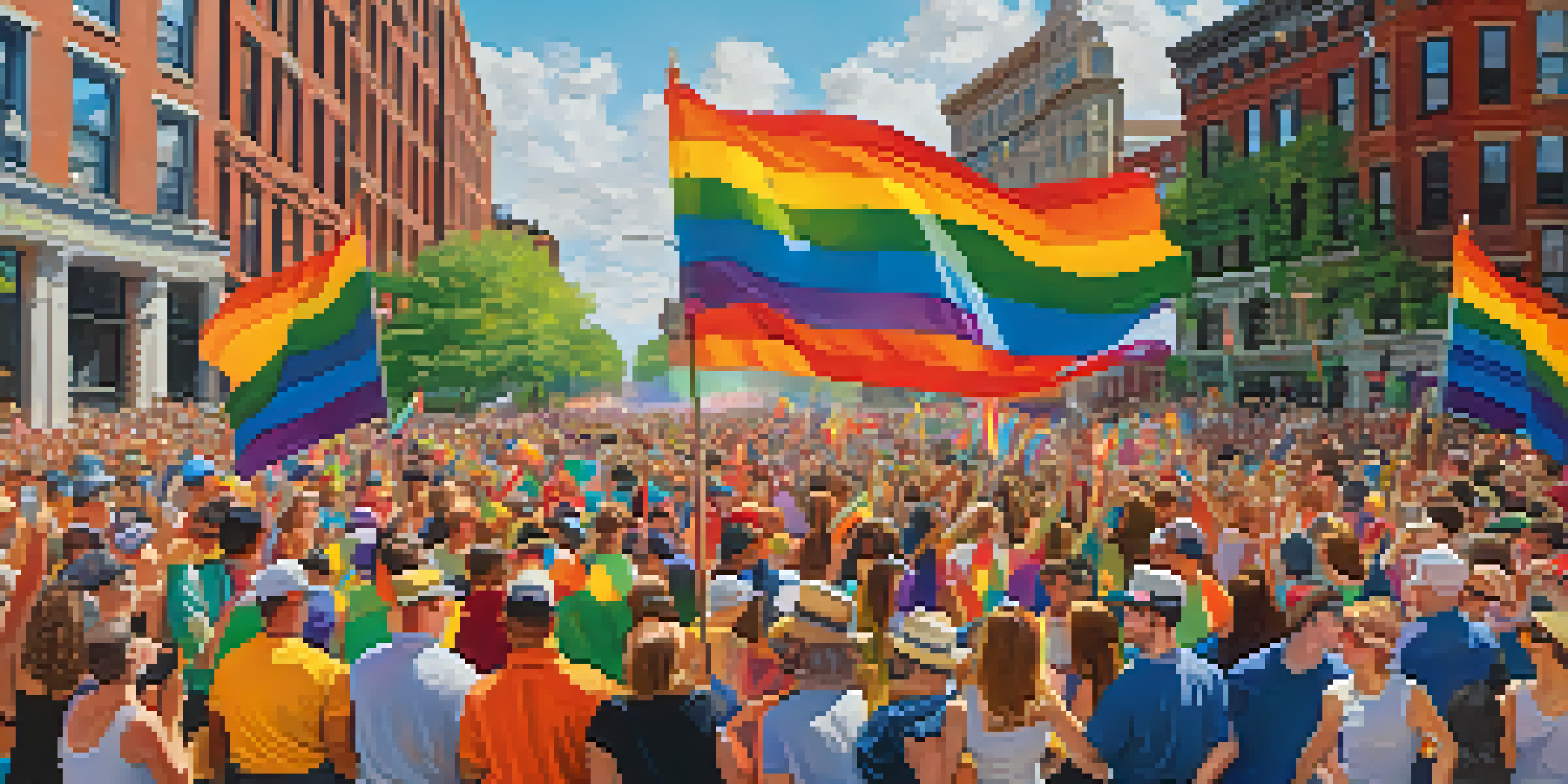Boston's LGBTQ+ Activism: Progress and Ongoing Challenges

A Brief History of LGBTQ+ Activism in Boston
Boston's journey toward LGBTQ+ rights began in the late 1960s, gaining momentum with the Stonewall Riots in 1969. Activists in the city rallied for visibility and rights, laying the groundwork for future movements. Early organizations, like the Boston Gay Liberation Front, emerged to challenge the societal norms of the time.
The most important thing is to be true to yourself and those around you.
Throughout the 1970s and 1980s, Boston became a hub for LGBTQ+ activism, with events like the first Pride March in 1970 marking significant milestones. These gatherings not only celebrated identity but also demanded equal rights and protections against discrimination. The AIDS crisis further galvanized the community, leading to advocacy for healthcare and funding.
As these early movements paved the way, Boston saw a gradual shift in public perception and policy. By the 1990s, LGBTQ+ individuals began to gain more visibility in politics and media, setting the stage for the progress that would follow. The city's activism laid a strong foundation that continues to influence today's battles for equality.
Milestones Achieved in LGBTQ+ Rights
Boston has achieved significant milestones in LGBTQ+ rights, including the legalization of same-sex marriage in Massachusetts in 2004. This landmark decision made Massachusetts the first state in the U.S. to recognize same-sex marriage, setting a powerful precedent for other states to follow. The ruling was a major victory for activists who had fought tirelessly for equality.

In addition to marriage equality, the city has implemented various anti-discrimination laws protecting LGBTQ+ individuals in housing, employment, and public accommodations. These legal protections reflect a growing recognition of the need for equity and justice within the community. Organizations like GLBTQ Legal Advocates & Defenders have played a crucial role in advocating for these rights.
Boston's Activism Roots Run Deep
LGBTQ+ activism in Boston began in the late 1960s, gaining momentum with the Stonewall Riots and leading to significant visibility and rights advancements.
Moreover, Boston's commitment to LGBTQ+ visibility is evident in its annual Pride celebrations, which attract thousands of attendees. These events not only celebrate the community but also serve as a reminder of the ongoing work needed to address systemic issues. It's a testament to how far the city has come while acknowledging the road ahead.
Current Challenges Facing the LGBTQ+ Community
Despite significant progress, Boston's LGBTQ+ community still faces numerous challenges. Discrimination and violence against LGBTQ+ individuals persist, particularly affecting people of color and transgender individuals. Reports of hate crimes highlight the urgent need for continued advocacy and awareness.
Injustice anywhere is a threat to justice everywhere.
Mental health disparities remain a significant concern, with LGBTQ+ youth experiencing higher rates of depression and anxiety. Factors such as bullying, family rejection, and societal stigma contribute to these issues. Community organizations are working to provide resources and support, yet access remains uneven.
Additionally, the ongoing debates surrounding transgender rights, particularly in healthcare and sports, have sparked division and controversy. As policymakers grapple with these complex issues, activists continue to push for inclusive policies that protect all members of the LGBTQ+ community. The fight for equality remains a pressing concern that demands attention and action.
The Role of LGBTQ+ Organizations in Boston
LGBTQ+ organizations in Boston play a vital role in advocating for rights and providing support. Groups like the Boston Alliance of LGBTQ+ Youth (BAGLY) focus on empowering young people through education and community engagement. Their efforts help foster a safe environment for youth to explore their identities.
Additionally, organizations such as the Fenway Institute work to address health disparities within the LGBTQ+ community. They provide crucial healthcare services and conduct research to improve overall well-being. Their work highlights the importance of tailored healthcare, especially in the wake of the COVID-19 pandemic.
Major Milestones for Equality
Boston achieved landmark victories, such as the legalization of same-sex marriage in 2004, setting a precedent for other states.
Moreover, these organizations often collaborate with local government and businesses to promote inclusivity. By hosting events and workshops, they create spaces for dialogue and education, helping to dismantle stereotypes and foster understanding. The impact of these efforts extends beyond the LGBTQ+ community, benefiting society as a whole.
Community Engagement and Activism Today
Community engagement in Boston's LGBTQ+ activism has taken on new forms in recent years. Social media platforms have become powerful tools for mobilizing support and raising awareness about pressing issues. Activists utilize these platforms to share stories, organize events, and advocate for change on a larger scale.
Grassroots movements have also gained momentum, with individuals coming together to address local challenges. Neighborhood initiatives focus on creating inclusive spaces and combating discrimination. These efforts demonstrate the power of community solidarity in driving change from the ground up.
Furthermore, intergenerational collaboration enriches the activism landscape. Older activists share their experiences and lessons learned, while younger voices bring fresh perspectives and energy. This blend of knowledge and innovation strengthens the movement, ensuring that the fight for equality continues to thrive.
The Impact of Education on LGBTQ+ Awareness
Education plays a crucial role in fostering understanding and acceptance of LGBTQ+ issues. Schools in Boston are increasingly incorporating LGBTQ+ history and rights into their curricula, promoting a more inclusive environment for all students. This educational approach helps to combat stereotypes and reduce bullying.
Moreover, LGBTQ+ organizations are partnering with educational institutions to provide training for teachers and staff. These programs equip educators with the tools needed to support LGBTQ+ students effectively. By creating safe spaces within schools, students can feel validated and supported in their identities.
Challenges Persist for LGBTQ+ Rights
Despite progress, the LGBTQ+ community in Boston continues to face discrimination, violence, and mental health disparities that require ongoing advocacy.
As awareness grows, the hope is that future generations will carry the torch for equality and inclusion. By instilling values of respect and acceptance from a young age, Boston is paving the way for a more equitable future. Education is not just a tool; it’s a catalyst for change.
Looking Ahead: The Future of LGBTQ+ Activism in Boston
As Boston's LGBTQ+ community looks to the future, the path ahead is both hopeful and challenging. With ongoing advocacy efforts, there's potential for continued progress in securing rights and protections. Activists remain committed to addressing the issues that still affect the community, such as discrimination and healthcare access.
Moreover, the rising visibility of LGBTQ+ issues in mainstream culture plays a significant role in shaping public perception. Increased representation in media and politics can lead to greater acceptance and understanding. The community's voice is becoming more prominent, and this momentum is crucial for future advancements.

Ultimately, the strength of Boston's LGBTQ+ activism lies in its resilience and solidarity. By uniting diverse voices and experiences, the movement can effectively tackle the ongoing challenges. The journey may be long, but with continued dedication, Boston can aspire to create a more inclusive and equitable society for all.